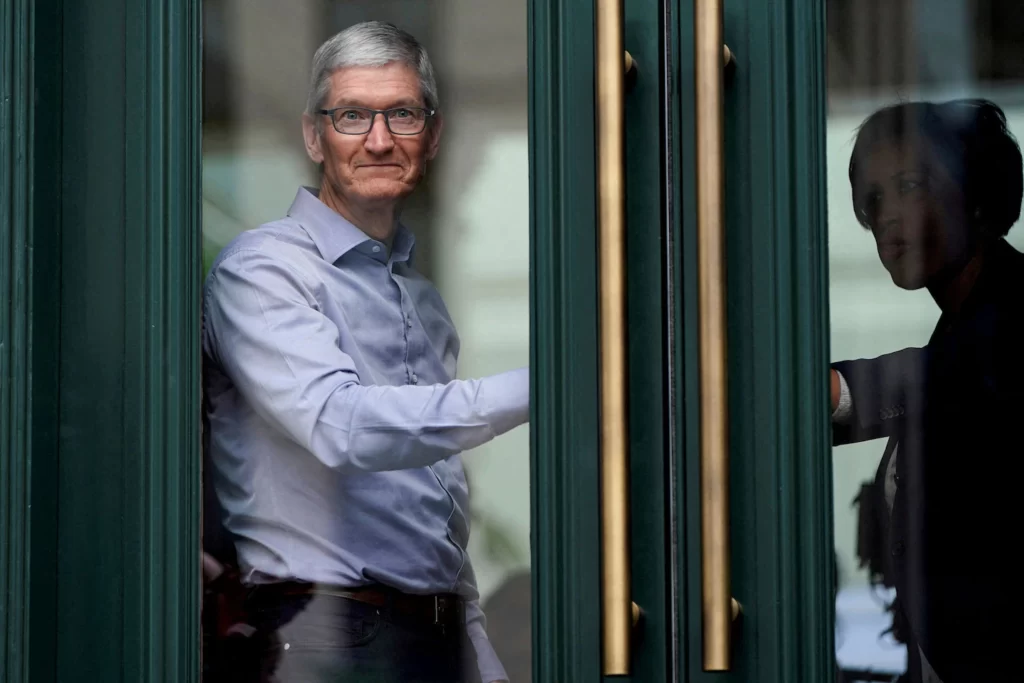On Friday, a day after Russia launched what he called “a deceptive and absolutely outrageous military attack” on his country, Mykhailo Fedorov, Ukraine’s minister of digital transformation, wrote a “Dear Tim” letter to the chief executive of Apple.
He asked Tim Cook “to stop supplying Apple services and products to the Russian Federation, including blocking access to the App Store!” He hoped, he wrote, “that such actions will motivate youth and active population of Russia to proactively stop the disgraceful military aggression.”
Cook’s public response, at least so far, has been silence. The day before, when the Russian attacks rolled into Ukraine, Cook also took to Twitter. “I am deeply concerned with the situation in Ukraine,” he wrote. “I am thinking of the people who are right now in harm’s way and joining all those calling for peace.”
Cook’s timidity is business as usual for a leader practiced in avoiding political controversy. He voices concern, not outrage. He is thinking of, but not doing a thing for, the Ukrainian people. And he calls for peace rather than condemning the actions of Vladimir Putin’s Russia.
These are the carefully chosen words of a man known for choosing his words carefully.
When Cook became CEO in 2011, weeks before the death of Steve Jobs, most observers thought him an unlikely or even accidental CEO. I was not among them. I had covered Cook’s ascent as the head of Apple’s supply chain operations. I described him as Jobs’s alter ego, an opposite so polar that Jobs could take comfort knowing he was being succeeded by someone not a bit like himself.
What I didn’t predict was how politically astute Cook would become by steering clear of politics. Cook has taken brave personal stands, including by coming out as gay in 2014 and throwing Apple’s support firmly behind LGBTQ rights. He has advocated for human rights, female representation on Wall Street, immigration reform and privacy rights.
While sometimes courageous, though, none of these positions have threatened Apple’s business much. In the case of privacy, Cook’s sometimes sanctimonious advocacy is in fact all about business. That’s because Apple, unlike Facebook and Google, doesn’t have a major advertising business that relies on tracking its users.
But when it comes to rocking the boat in ways that could compromise Apple, Cook has stood studiously above the fray — when he’s not actively supporting political figures he presumably might loathe. Though he donated to Hillary Clinton’s 2016 campaign, Cook became one of Donald Trump’s favorite CEOs, dining privately with the president and speaking regularly to him. The courtship was fruitful: Cook supported Trump’s reduction of corporate taxes and skillfully persuaded Trump to refrain from imposing tariffs on China that would have affected the importation of Apple’s products manufactured there.
He has been equally effective at avoiding criticism of Xi Jinping’s China. In 2017, I interviewed him at the government-supported Fortune Global Forum in Guangzhou and asked about Apple’s willingness to toe the Chinese line, including his appearance days earlier at an event produced by China’s Internet censor. “I know that every country in the world decides their laws and regulations,” he said, the message being that Apple would play by Beijing’s rules. His efforts have paid off. After seeing market share declines in iPhones, Apple recently became the top-selling smartphone in China.
Cook’s pragmatism would be more palatable if he didn’t wrap himself, and Apple, in a cape of idealism. He has kept a photo Robert F. Kennedy in his office, and his Twitter profile quotes the Rev. Martin Luther King Jr. asking, “What are you doing for others?”
What can Cook do? At minimum, he can add his considerable voice to let the world know Apple abhors Putin’s criminality. Even Facebook parent Meta, referenced the “invasion of Ukraine” in explaining several actions it took to restrict Russia’s use of its platform. Elon Musk responded to another Ukrainian plea to provide SpaceX’s Starlink satellite service over the country. YouTube temporarily halted the ability of Russian media outlets to monetize their content. Disney paused its releases in Russia; Airbnb has provided funds to open homes to Ukrainian refugees.
Stopping phone sales or suspending the App Store in Russia could have unintended consequences, such as keeping anti-Putin dissidents from communicating via Telegram. Then again, kicking Russian gamers off Apple’s Arcade app or music lovers off Apple Music — and loudly explaining why — might embolden opposition to Putin, just as the Ukrainian digital minister hopes.
Apple did not respond to a request for a comment on its reaction to the Ukraine crisis. Cook has tweeted only once since his comment on “the situation” in Ukraine. It was to note what would have been the 67th birthday of Jobs, who struck high-minded notes about Apple changing the world while making it a point to keep Apple out of politics. “In these challenging times, I’m remembering his call for us to use our time wisely, to pursue excellence, and to leave the world better than we found it,” Cook wrote.
Jobs would indeed be proud.


